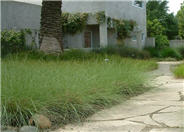
Common name:Canary Island Date Palm
Botanical name:Phoenix canariensis
The Phoenix canariensis is a large-growing, wide-spreading palm with a crown of many long arching fronds. It needs ample room for proper growth.

Common name:Mendocino Reed Grass
Botanical name:Calamagrostis foliosa
This tufted perennial bunchgrass is native to the Northern California coastal scrub. It forms a beautiful, dense mound of grey-green leaves that reach 2' tall, with showy arching buff colred flower stalks to 3' tall in spring and summer. Reed Grass foliage turn into an attractive purple coloration in the fall and winter. This evergreen should be grown under sun, with little or no summer watering required. -Monterey Bay Nursery

Common name:Purple Smoke Tree
Botanical name:Cotinus coggygria 'Purpureus'
A deciduous shrub or small tree that grows up to 10' tall, the "Purpureus" is grown for its wispy, thread-like flower clusters in summer. Its green foliage turns a brilliant purple and then yellow to red in the fall. This shrub is a show stopper! It prefers full sun but will do better with afternoon shade in hot inland areas. This attractive shrub is drought tolerant once it's established.

Common name:Autumn Moor Grass
Botanical name:Sesleria autumnalis
A small, mounding grass with yellow-green leaves that reaches 12" high. In the fall, it sends up narrow flower stems that have a silvery-white inflorescence. When planted in masses, it has a striking appearance. It is drought tolerant.

Common name:Common Field or Slender Sedge
Botanical name:Carex praegracilis
This California native grass can tolerate occasional flooding or standing water as it is found in marshes and wetlands. It does make a great lawn substitute as it can be mowed, will take sun and part sun and need watering once a week in hot summer months. This sedge uses much less water than sod. It can be used for erosion control also.
Putting the right plants in the right places in the right groupings is both the challenge and art of good landscape design.
Click in the green box for more information
If you have impermeable paving that you would like to make permeable, there are two main methods for doing so:
1. Break up hard paved surfaces to create spaces for water to seep through.
2. Remove and replace the surfaces with permeable paving.
Click in the green box for more information
Designer: Cornflower Farms
Photographer: GardenSoft
Practice grass-cycling by leaving short grass clippings on lawns after mowing, so that nutrients and organic matter are returned to the soil.
Develop healthy soil for plants that are vigorous and naturally pest-resistant.